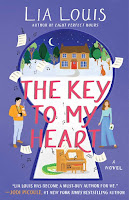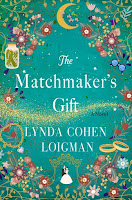Author: Viola Shipman
Publication Information: Graydon House. 2023. 352 pages.
ISBN: 152580507X / 978-1525805073
Book Source: I received this book through NetGalley and a publisher's blog tour free of cost in exchange for an honest review.
Opening Sentence: "It was the spit heard 'round the world!"
Favorite Quote: "So much of life is an illusion. We create this image of what a perfect life and family is supposed to be. And when it doesn't turn out that way, we seek distraction or perfection, but it will never be that way. The glass is going to crack at some point in our lives. We just have to decide if we're going to be the ones to get cut or to clean it up and move on."
***** BLOG TOUR *****
Review
I enjoyed the very first Viola Shipman book I read for a simple reason stated in my review of The Recipe Box... Sometimes, I just need a feel good book that reminds me of the priorities in life and the bonds of family. This is one of those books.That reason continues to hold through the author's books. The books continue to be set in beautiful northern Michigan settings and continue to be about family and friendship. The stories continue to go in predictable directions, which is part of the expectation now. As a reminder, Viola Shipman is the pen name for Wade Rouse, a popular, award-winning memoirist. Rouse chose his grandmother's name, Viola Shipman, to honor the woman whose heirlooms and family stories inspire his writing.
This book is the story of two women. Mary Jackson is elderly woman running a store in the small town of Good Hart, Michigan. Beck Thatcher (like the Mark Twain character!) is a school administrator, who comes to the Lake Michigan coast with her best friend after a breakup. She has fond memories of the area from childhood trips with her grandparents.
The connection between the two women is tangential. The idea of a Fata Morgana is introduced. A Fata Morgana is a mirage viewed at the horizon. This tangential connection and a chance meeting becomes the basis for the book.
The arc of the story can be described in two statements in the book about the Very Cherry General Store.
From
"The Very Cherry General Store epitomizes what we all want and desire in our lives again: nostalgia. Escape. A return to the simplicity of small-town life. Life as it should be, on our own terms, not as it really is."
To
"I know this isn't the charming Norman Rockwell picture you'd expect when you wander into the Very Cherry General Store, but every story is carefully edited. Every legend becomes a legend for a reason."
The setting of this book is beautiful. The small town intrigues are entertaining. The individual histories of the women make for good stories. The bonds of friendships - old, new, and rediscovered - are lovely to read about. However, the connection between the two women is so tenuous that the instant connection and resulting conclusions becomes a little far fetched. The emotional bond attempted in the book fails to completely connect for me. An entertaining summer read but perhaps not as engaging as some of Viola Shipman's other books.
About the Book
Fried Green Tomatoes meets Midnight at the Blackbird Café in USA Today bestselling author Viola Shipman’s FAMOUS IN A SMALL TOWN, a heartwarming story about intergenerational friendship and self-discovery, set in beautiful Northern Michigan.In 1958, 15-year-old Mary Jackson became the first woman ever crowned The Cherry Pit Spittin’ Champion of Good Hart, Michigan, landing her in the Guinness Book of World Records, and earning her the nickname Cherry Mary. Nearly 80 years old at the story’s start, Mary runs The Very Cherry General Store, a business that has been passed through three generations of women in the family. While there is no female next of kin, Mary believes the fourth is fated to arrive, as predicted by “Fata Morgana,” a Lake Michigan mirage of four women walking side by side.
Becky Thatcher (yes, like the Mark Twain character), an Assistant Principal from St. Louis, has just broken up with her long-term boyfriend and heads to Good Hart for a healing girl’s trip with her best friend. When Becky drunkenly spits a cherry pit an impressive distance, Mary urges her to enter the upcoming contest, and wonders if Becky could be the woman she’s been waiting for.
Inspired by, and paying tribute to, Michigan’s National Cherry Festival, to the Tunnel of Trees, to lake life, and to the beauty of intergenerational friendship, FAMOUS IN A SMALL TOWN is "full of summertime delight…and sweet, nostalgic charm” (Heather Webber, USA TODAY bestselling author of Midnight at the Blackbird Café).
Bursting with memorable characters and small-town lore, FAMOUS IN A SMALL TOWN is a magical story about the family you’re born with, and the one you choose.
About the Author
VIOLA SHIPMAN is the pen name for internationally bestselling author Wade Rouse. Wade is the author of fifteen books, which have been translated into 21 languages and sold over a million copies around the world. Wade chose his grandmother’s name, Viola Shipman, as a pen name to honor the working poor Ozarks seamstress whose sacrifices changed his family’s life and whose memory inspires his fiction.Wade’s books have been selected multiple times as Must-Reads by NBC’s Today Show, Michigan Notable Books of the Year and Indie Next Picks. He lives in Michigan and California, and hosts Wine & Words with Wade, A Literary Happy Hour, every Thursday.
Excerpt
Excerpted from Famous in a Small Town. Copyright © 2023 by Viola Shipman. Published by Graydon House, an imprint of HarperCollins.THE LAKE EFFECT EXPRESS
August 1958
“Good News from Good Hart!”
by Shirley Ann Potter
It was the spit heard ’round the world!
Our town is still atwitter over the news that the daughter of Mr. Peter Jackson was crowned the 35th Annual Cherry Pit Spittin’ Champion of Leelanau and Emmet County last Saturday. Fifteen-year-old Mary Jackson, an Emmet County high-school sophomore, was not only the first woman—uh, girl—to win the contest, but her stone flew a Guinness Book of World Records–breaking distance of ninety-three feet six-and-a-half inches, shattering the previous record set by “Too Tall” Fred Jones in 1898 at the state’s very first Cherry Championship right here in Good Hart.
News of her accomplishment has flown farther than her cherry pit, with reporters from as far away as New York and London anointing our town sprite with the moniker “Cherry Mary.”
I caught up with Mary at the Very Cherry General Store—our beloved post office/grocery store/sandwich-
and-soda-shop run by Mary’s mother and grandmother—to see how she managed such a Herculean feat.
“My mom taught me to whistle when I was a kid (“A kid!” Don’t you just love that, readers?), and I had to be loud enough for her to hear me when she was down at the lake. I think that made my lips strong,” Mary says. “And I started eating sunflower seeds when I was fishing on the boat with my grandma. She taught me how to spit them without having the wind blow them back in the boat.”
Mary says she practiced for the contest by standing in the middle of M-119—the road that houses our beautiful Tunnel of Trees—and spitting stones into the wind when a storm was brewing on Lake Michigan.
“I knew if I could make it a far piece into the wind, I could do it when it was still.”
While her grandmother was “over the moon” for Mary’s feat, saying, “It’s about time,” Mr. Jackson says of his daughter’s accomplishment, “It’s certainly unusual for a girl, but Mary isn’t your average girl. Maybe all this got it out of her system, so to speak. I hope so for her sake.”
The plucky teenager seems nonplussed by the attention, despite seeing her face all over northern Michigan in the papers and the T-shirts featuring her face—cheeks puffed, stone leaving her mouth—and the words Cherry Mary in bright red over the image.
“A girl can do anything a man can,” Mary says in between retrieving mail, spreading mayonnaise on a tomato sandwich and twirling a cherry around in her mouth, before perfectly depositing the stone in a trash can across the room. “You just gotta believe you can. That’s the hard part. Harder than spitting any old pit.”
Mary seems ready to conquer the world, readers. Cheers, Cherry Mary! Our hometown heroine!
*******
BECKY
June 2023
“Okay, Benjie, would you like it if Ashley did this to you?”
He scrunches up his face to stave off tears and shakes his head. “No.”
“Well, it’s not a nice thing to do.”
I study Ashley’s hair, then take her face in my hands. “It’s going to be okay. Trust me?”
The little girl nods her head. I give her a hug.
I walk over to my desk and open the bottom drawer . There is a large jar of creamy peanut butter sitting next to a bag of mini Snickers. The peanut butter is for emergencies like this: removing gum from a little girls’ hair. The Snickers are for me after I’m finished with this life lesson.
“Well, I’m just glad neither of you are allergic to peanuts,” I say. “Allows me to do this.”
I cover the gum stuck in the back of Ashley’s pretty, long, blond hair and then look at her.
“I promise this works,” I say. “I’ve performed a lot of gum surgery.”
She nods. Her eyes are red from crying, her cheeks blotchy.
“Why did you do this, Benjie?” I ask the little boy seated in the chair before my desk.
He ducks his head sheepishly, his brown bangs falling into his eyes, and murmurs something into his chest.
“I didn’t catch that,” I say. “What did you say? Remember it’s okay to express your emotions.”
He looks at me, freckles twitching on his cheeks. “I can’t say,” he whispers.
“Yes, you can,” I say. “Don’t make this any worse than it already is.”
Benjie glances toward the door to ensure that it is closed. “Tyler Evans told me to do it or he’d punch me on the way home.”
Being a grade-school administrator is akin to being a detective: you have to work the perp to get the truth. Eventually—no matter the age—they break, especially when a verdict on punishment is waiting in the balance.
It’s the last day of school. Benjie does not want his summer to be ruined.
I lean down and slide the gum out of Ashley’s hair. I go to my sink, dampen a cloth and put some dish soap on it, return and clean the rest of the peanut butter off her locks. I move to a tall filing cabinet and retrieve a clean brush. The filing cabinet is filled with bags of sealed brushes and combs, toothbrushes and EpiPens, certificates and old laptops. I run the brush through her hair. I hold up a mirror for her to see the back of her head.
“See, good as new.”
“What do you say to Ashley, Benjie?”
“I’m sorry.”
“Do you accept his apology?”
Ashley shakes her head no. “You ruined the last day of school. You’re a big ol’ meanie.”
“Ashley,” I say, my tone sweet but authoritarian.
“I accept your apology,” she says.
“You’re free to go,” I say to her.
“But you’re still a big ol’ poop head,” she says, racing out of my office, bubblegum-free hair bouncing.
I actually have to clench my hands very hard to stifle a laugh.
Big ol’ poop head.
How many times a day would I—would any adult—like to scream that at someone?
“Are you telling my parents?” Benjie asks.
“I have to,” I say, “but I’ll tell them why you did it, and then I’ll have a talk with Tyler.”
“No!”
“I have to do that, too,” I explain. “And I’ll talk to his parents as well.”
He looks at me, his chin quivering.
“We have a zero-tolerance policy here for bullying,” I say. “Trust me, Tyler won’t do it again. You have to stand up to bullies. You have to show them the right way to do things. Otherwise, they never change.”
In addition to being a detective, an assistant principal is also akin to being the vice-president of the United States. Everyone knows your name, everyone knows you’ve achieved some level of status, but nobody really understands what the hell you do all day.
“I promise it will be okay,” I say. “Just promise me you won’t do it again. You’re a nice boy, Benjie. That’s a wonderful thing. Always remember that.”
“I promise.” He looks at me. “Can I go now?”
“One more thing. You know you aren’t supposed to bring gum to school.”
“I know. But one of the moms was handing it out before school.”
Mrs. Yates, I instantly know. She wants to be the cool mom. She’s Room Mom for 2A, and, Mrs. Trimbley, the Room Mom for 2B, told me that competing with her this year was like being a contestant in Squid Game.
Benjie continues. “It’s Bubble Yum. My favorite. My mom won’t let me have it because it’s bad for my teeth.”
Benjie opens his mouth and smiles. He resembles a jack-o’-lantern. He’s missing teeth here and there, willy-nilly, black holes where baby teeth once lived and adult teeth will soon reside.
Too late, I want to say to Benjie, but he won’t get my humor. Only my best friend, Q, understands it, and my grandparents who made me this way.
I think of how much I loved chewing gum as a kid.
“Do you have any more?”
“Am I going to get in trouble again?”
“No,” I say with a laugh.
He reaches into the pocket of his little jeans and hands me a piece of grape Bubble Yum.
My favorite.
“Do you know what my teacher used to say when I’d sneak gum into class?”
“You snuck gum into class?”
He stares at me with more admiration than if Albert Pujols from the St. Louis Cardinals suddenly appeared with an autographed baseball.
“I did,” I say. “It was about the only bad thing I ever did. My teacher used to hold out her hand in front of my desk and ask, ‘Did you bring enough gum to share with the whole class?’”
“Did you?” Benjie asks, wild-eyed.
“No,” I say. “That was the whole point. She wanted to embarrass me. And it always worked. Teachers just liked to say that.”
I take the gum from Benjie. “This is just between us, okay?”
He giggles and nods.
I pop the gum into my mouth. It’s even more insanely sweet and sugary and tastes even better than I remember. My taste buds explode. I chew, Benjie watching me with grand amusement, and then—looking out my window to make sure the coast is clear—blow a big bubble. A massive bubble, in fact. It expands until it’s the size of a small balloon. Benjie continues to watch me in silence as a child today might do today trying to figure out how to use a rotary phone. After a few moments, the flavor subsides.
“Want to learn a trick?” I ask.
“Yeah!”
“If you ever get caught chewing gum, don’t stick it in a nice girl’s hair or swallow it. Learn to do this.” I narrow my lips as if I’m going to whistle, puff my cheeks and spit my gum into the air as if Michael Jordan were draining a game-winning three-pointer as time expired. The purple gum arcs into the air and deposits directly into a trash can next to a low-slung sofa ten feet across my office.
Benjie pumps his fist and lifts his hand to high-five me.
“Where did you learn to do that?” he asks.
“Sunday school,” I wink. “My grandma taught me.”
Buy Links
HarperCollins: https://www.harpercollins.com/products/famous-in-a-small-town-viola-shipman?variant=40980279459874Barnes & Noble: https://www.barnesandnoble.com/w/famous-in-a-small-town-viola-shipman/1142722523
BookShop: https://bookshop.org/p/books/the-champion-of-good-hart-viola-shipman/18794129?ean=9781525804854
Amazon: https://www.amazon.com/dp/1525804855/keywords=fiction?tag=harpercollinsus-20
Social Links
Author WebsiteTwitter: @Viola_Shipman
Facebook: Author Viola Shipman
Instagram: @Viola_Shipman
Goodreads
Please share your thoughts and leave a comment. I would love to "talk" to you.







